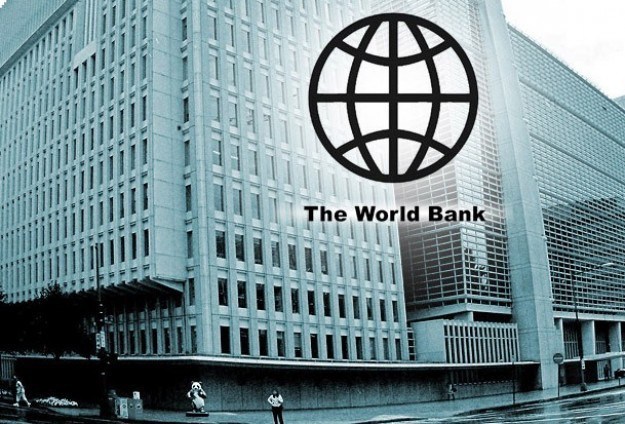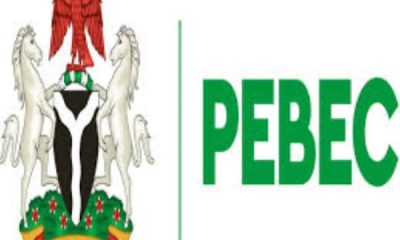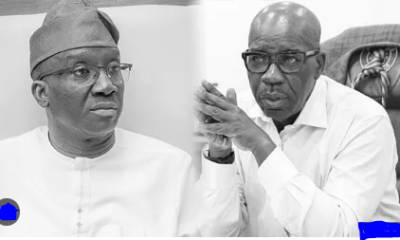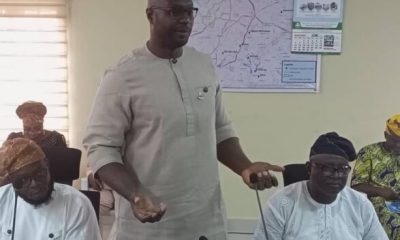Business
Bank and Nigeria’s push for enabling environment
According to the World Bank, SABER will prioritize critical measures and interventions, with a focus on accelerating targeted business-enabling environment reform actions at the state level.
Published
3 years agoon
By
Publisher
By Marcel Okeke
In its continued efforts at supporting the improvement of business environment in Nigeria, the World Bank recently approved a US$750 million International Development Association (IDA) credit to prop Nigeria’s State Action on Business Enabling Reforms (SABER) Program-for-Results (PforR). Nigerian Government’s SABER program seeks to build on the accomplishments of the Presidential Enabling Business Environment Council (PEBEC) which was set up in 2016.
Also read: Nigeria’s debt service-to-revenue to hit 102.3%, World Bank warns
Building on the reforms of PEBEC, SABER seeks to accelerate the implementation of critical actions to improve the business environment in various states in Nigeria.
According to the World Bank, SABER will prioritize critical measures and interventions, with a focus on accelerating targeted business-enabling environment reform actions at the state level.
Its focus is to strengthen the existing PEBEC subnational interventions by adding incentives such as results-based financing to the states as well as the delivery of wholesale technical assistance (TA) available to all states to fill up gaps in reform implementation.
The proposed operation is aligned with the World Bank Group’s Nigeria Country Partnership Framework (CPF) for financial year 2021-2025. The CPF reflects Nigeria’s aspiration for faster, more inclusive and sustained economic growth in the next decade to help the government in its aspiration to lift many people out of poverty.
This Program directly supports the CPF’s pillar of ‘promoting jobs and economic transformation and diversification and the related complementary priority of furthering business enabling reforms and promoting competitive clusters’.
SABER also aims to contribute to the related core objectives of increased access to reliable and sustainable power for households and firms and the development of digital infrastructure, platforms, and skills in Nigeria.
Also read: High inflation frustrating Nigeria’s economic recovery, World Bank warns
SABER program documents show that the proposed initiative will focus on the following specific areas: Improved Land Administration and Land Investment Process. Under this Area, the Progam-for-Result (PforR) will support states to promote more transparency and accountability in land administration services; produce better quality data on land ownership and strengthen sustainability and transparency in the land acquisition procedures for large-scale agricultural investment.
Expectedly, this will lead to states improving access to land-based investments and securing private investments that better meet socioeconomic objectives and are inclusive.
This is followed by improved Business Enabling Infrastructure. Under this, the PforR will support states to instil more transparency and accountability in resolving complaints with electricity distribution companies (DISCOs); identify and match off-grid demand clusters with off-grid electricity suppliers. It will support the full adoption by states of the new Right of Way (ROW) fees of 145 Naira per meter for broadband without reformulating them as new or increased charges. Moreso, it will adopt a wholesale access legal and regulatory framework, including having dominant providers provide transparent, cost-based, and non-discriminatory wholesale access.
All these will lead to states having a quicker resolution of customers’ complaints to DISCOs, greater off-grid demand being supplied by off-grid suppliers, and new routes with fibre optic cable for broadband deployed.
The third area of focus speaks to increased sustainable large-scale investments. Under this, the PforR will support states to set up a public-private-partnership (PPP) coordination unit to better identify, vet, and implement PPP projects; better manage PPP risks, especially fiscal commitments and contingent liabilities; establish a PPP Project Facilitation Fund; promote transparency of state incentive frameworks, and strengthen states’ investment promotion and investor aftercare capabilities. This will lead to states having a more effective and sustainable attraction and delivery of PPP transactions, stronger risk management, better provision of investor services by state investment promotion entities, and investors having greater access to available incentives.
Under the fourth focus area, enabled firm operations, the PforR will support states in providing more transparent and predictable public services to investors; apply risk-based inspections and licensing approaches to businesses; rationalize inter-state fees and export procedures; adopt a presumptive turnover tax for small businesses and consolidate payment of key state and local government taxes and other fees and levies through an e-platform which includes electronic notifications of outstanding payments and e-receipts; and establish special courts for smaller size commercial disputes and put in place practice directions to strengthen court practices and encourage alternative dispute resolution (ADR), while introducing automated case management systems in the courts.
This will lead to states achieving greater regulatory efficiency with lower compliance costs imposed on firms, less discretionary behaviour by state ministries, departments, and agencies (MDAs), improved domestic and external trade, and increased tax compliance by businesses.
In the last focus area – workers’ skills, the PforR will support states to develop a state talent pool available to hiring firms; conduct a skills gap audit; establish a skills development centre, and establish a digital lab to support digital skills and entrepreneurship. This will lead states to develop greater talent and diversity available to firms.
The ‘weak link’ in all of these lofty ideals however is the notorious inefficiency in the Ministries, Departments and Agencies (MDAs), especially at state levels; and they, incidentally, form the pivot of the SABER PforR initiative.
No doubt that opaque and/or shoddy land administration as well as poor public service delivery at the subnational level has stymied the pace of economic development of the country. Public-Private-Partnership (PPP) as a veritable funding option for critical infrastructure at various tiers of Government, for instance, has hardly been adequately explored due to inherent lack of skills or political will. This is where urgent skills gap audit and appropriate measures to fill up any hiatus noticed is imperative for meaningful development.
However, the place and role of state governors (as chief executive officers) at the subnational level is even more critical to the successful implementation of the SABER PforR.
The national ‘cake sharing’ penchant of the state governors and their apparent low premium on tangible development milestones could undermine the intendments of the lofty initiative. This is especially of concern, now that most of the governors who should ‘preside over’ the implementation of the ‘great idea’ are on the last lap of their tenures in office.
Nigeria is in the throes of a general election in early 2023, when many of the state governors will be vying for re-election or completing their last term. Either way, they pay scant or no attention to meaningful development issues; and the bureaucracy is understandably tied to the apron strings of the powers that be at all tiers of Government.
Howbeit, all these concerns pointedly underline the fact that the World Bank and other stakeholders should go beyond the ‘paper work’ and deploy effective implementation and monitoring mechanisms to see the initiatives to fruition.
In truth, if the efforts of the President Enabling Business Environment Council (PEBEC) have yielded the much-desired results, the crucial World Bank facility and the SABER PforR initiative would not have been necessary. Alas, however, useful lessons have been learned.
- Okeke, an economist, sustainability expert and business strategy consultant, writes for National Daily. He can be reached at: [email protected]
You may like


FG Launches Ports Customs Efficiency Committee to Boost Trade, Cut Red Tape


Obaseki slams Okpebholo’s allegations, Urges focus on Governance


Amid challenges, World Bank gives Nigeria’s NIN registration pass mark


Cash transfers can save Nigerians from falling deeper into poverty – World Bank


Oyo State Government seeks World Bank’s support


Group scolds World Bank over subsidy crisis
Trending

 Health1 week ago
Health1 week agoFOI data show thousands of heart failures reports linked to AstraZeneca COVID-19 vaccine

 Latest1 day ago
Latest1 day agoYoruba film industry mourns as popular actress aunty Ajara passes away

 Trends2 days ago
Trends2 days agoTonto Dikeh reunites son with Churchill after decade-long split

 News1 week ago
News1 week agoTinubu approves purchase of 2 new satellites to strengthen Nigeria’s digital infrastructure

 Health1 week ago
Health1 week agoInvestigation uncovers industrial-scale counterfeit hub in Lagos’ Ojo Barracks

 Crime1 week ago
Crime1 week agoUK Court hears digital, financial evidence in Diezani Alison-Madueke corruption trial

 Crime1 week ago
Crime1 week agoArmy busts human trafficking ring, rescues day-old baby listed for ₦3m

 Energy6 days ago
Energy6 days agoNNPC unveils gas master plan to boost Nigeria’s energy sector

